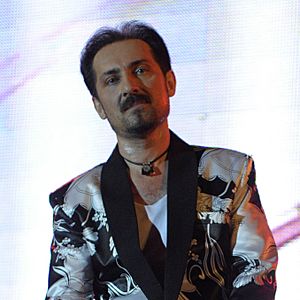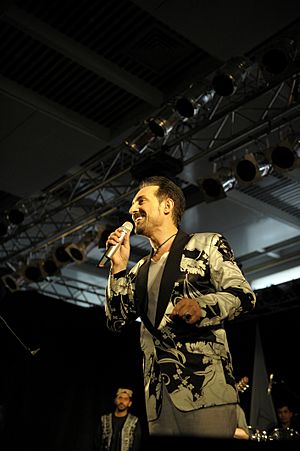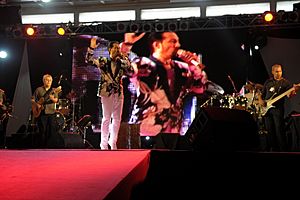Farhad Darya facts for kids
Quick facts for kids
Farhad Darya
فرهاد دريا |
|
|---|---|

Farhad Darya in 2010
|
|
| Background information | |
| Birth name | Farhad Nashir |
| Born | 22 September 1962 Gozar Gah, Kabul, Kingdom of Afghanistan |
| Genres | |
| Occupation(s) | Singer, composer, human rights activist, peace ambassador |
| Instruments | Harmonium, keyboard, guitar |
| Years active | 1980–present |
Farhad Darya is a famous singer, composer, and helper of people from Afghanistan. He was born on September 22, 1962. Since the 1980s, Farhad Darya has been one of the most well-known and important pop musicians in Afghanistan. He helped create a new style of music there. His music mixes different types, like pop, folk, and rock. He sings in many languages, including Dari Persian, Pashto, Uzbek, Hindi, and English.
Besides his music, Farhad Darya is also a kind person who works for human rights. He was a special ambassador for the United Nations Development Program (UNDP) in Afghanistan. He also helps many charities, like Music Village.
Contents
Farhad Darya's Early Life and School
Farhad Darya was born Farhad Nashir in Kabul, Afghanistan. His family came from a place called Kunduz Province. He is the grandson of a respected person named Sher Khan Nashir.
After moving back to Kabul, he finished high school at Habibia High School. Then, he went to Kabul Polytechnic University, where he started his first music band. Later, he studied Persian literature at Kabul University. During this time, he wrote songs for other singers using the secret name Abr, which means "Cloud." He also started playing Afghan and Indian classical music. He had to leave university several times to join the Afghan Armed Forces for a short time. By 1988, he was teaching classical music at the university and studying music deeply.
Farhad Darya's Music Journey
Starting with Goroh-e-Baran
Farhad Darya first appeared on TV and radio as the leader of a band called Goroh-e-Baran, which means "Rain Band." This band played a fresh style of folk-pop music. It became one of the most popular bands in the 1980s. They had hit songs like "Aay-e-Mann" and "Dokhtar-e-Sardaar." After the band broke up, Farhad Darya started singing by himself. He says he was the first to use a special way of recording music called multitrack recording in Afghanistan in 1986. This allowed him to record many sounds at once.
Throughout his career, Darya created music that was different from traditional styles. His songs mix Western pop sounds with classical music from Afghanistan and India. Many of his songs talked about the Soviet–Afghan War and the sadness it caused. He also sang about love. Some of his popular songs were "Freshta Jan" and "Mehrabaani." Many of his songs were not allowed to be played because they criticized the government. But this rule was later removed.
Albums Made While Living Abroad
In 1990, Farhad Darya left Afghanistan. He traveled through Prague and Paris before settling in Hamburg, Germany. He started recording new songs in Paris and Hamburg for his first album while living outside his home country. This album, called Begum Jaan, came out in 1992. It had a popular song called "Kabul Jaan," which means Beloved Kabul. This song was played by Afghan fighters when they entered Kabul. Nine years later, it was the first song played on Radio Afghanistan after the Taliban government fell.
His next album, Afghanistan, came out in 1995 and was a big success. It had many popular songs in different traditional Afghan styles. The hit song from this album was "Golom Golom." After this, Darya and his wife, Sultana, moved to Virginia in the United States. He continued his music career there and released his next album, Shakar, in 1997. This album was also very popular and had many upbeat dance songs.
In 1999, Darya made the music for an Afghan-American movie called In Foreign Land. It included a hit song called "Khosham Meeayad."
Salaam Afghanistan and Recent Music
After being away for thirteen years, Farhad Darya returned to Afghanistan. He then worked on his album called Salaam Afghanistan, which means Hello Afghanistan. This album was a huge hit in the country and was the first big success after the Taliban era, when music was not allowed. Thousands of CDs were sold, and the main song, "Salaam Afghanistan," became very popular. A music video for the album, filmed entirely in Afghanistan, was released in 2004.
On May 14, 2004, Darya held a large concert at Kabul's Ghazi Stadium. About 45,000 excited people came to the concert. This was the first big music event after the Taliban government. A British magazine called Songlines listed this concert as one of the 50 Great Moments in World Music in 2008. Darya said the event felt like a "national independence day."
Darya then worked with a German rock musician named Peter Maffay to help children. This led to his first rock song, and the first mainstream Afghan rock song, called "Salamaalek." He sang it in both Dari and English. The song was on Maffay's album Begegnungen – Eine Allianz für Kinder, released in 2006. The album was very popular in Germany, and "Salamaalek" was also liked in Afghanistan.
In August 2007, Darya finished his new album, HA!, which was released in Afghanistan and other places. This album was different from his earlier work. It was called "world pop" because it mixed Eastern and Western music. It included a music video for the hit song "Dohle Bezan (Nazdeek Shodan)," which means Talk To Me or Closer. This rock song, which used Indian drums called dhol, was shown on national television in February 2008. It called for people to unite. Darya worked on the video for eight months and traveled to different parts of Afghanistan to film it. He said that rock music is "protest music" and a good way to share a message loudly.
Darya's next album, Yaahoo, came out in August 2008. He called it a "peace album" and gave away free CDs in Afghanistan. This album was part of a program that promoted peace through music.
Latest Music Projects
In 2009, he released new songs like "Atan" and "Sarzamine Man." In 2010, Darya started the Life Is Beautiful tour, traveling around Afghanistan to perform for peace. This included a concert just for women in Mazar-i-Sharif on World Peace Day, with 15,000 people attending. He even held a concert in the Helmand Province in November 2010, where 5,000 people safely watched him sing. British forces praised this concert. In 2011, he released a music video for the tour's title song, "Zhwand Khkolai Dai."
Darya performed at the 7th Annual ATN Awards in Delhi in 2013, alongside other famous singers.
Darya's song "Oo Ghaita," meaning "those days," was released with a music video in February 2014. Darya wrote both the music and the words. The song was about missing the past, especially Afghanistan before the war. It was a well-known song and received some comments about its meaning. Darya said it was a "personal story" and not about politics.
In 2019, there was talk on social media that Darya might quit music. He later explained that it was about personal challenges that changed him. He released new songs in 2020: "Corona" and "Dashte Noqra." In 2022, to show his disagreement with the Taliban's rules against music, he started the "Music Never Dies" protest concert tour and released a new song, "Dar Molkake Ma."
Helping Others and Campaigns
After returning to Afghanistan in 2003, Farhad Darya started a non-profit group to help children. He later began a project for street children called Kochah. In 2006, his efforts earned him much praise, including a Human Rights Award. Darya became a special ambassador for the UNDP in Afghanistan in 2008. He used music to "carry the message of peace." He said that music has a strong power because it goes "directly to people's hearts."
In 2014, he started a blood donation drive for the Afghan national security forces called 'Karzar Qatra Qatra ba Darya'. Darya and his wife, along with other artists, supported the #WhereIsMyName campaign. This campaign helped women use their public names freely, and it led to a change in law in 2020.
In 2020, Darya wrote a letter against tearing down Kabul's old Cinema Park, but it was still torn down. In 2022, he asked the president of Tajikistan to help Afghan refugees who had lost their homes.
In 2023, Darya and 14 female painters started an art campaign to support women in Afghanistan.
Awards and Recognition
Farhad Darya is very well-known among Afghans. He is praised for helping people accept different cultures and for promoting peace. He has also been recognized by Western media. In 2009, UNAMA called him "Afghanistan's most popular singer," and NPR called him the "biggest musical star." Darya is also known in other Persian-speaking countries like Iran and Tajikistan, and in parts of Pakistan and Central Asia.
Some Western media have called him the Afghan Elvis because of his fame. Darya said this nickname was "sweet" but that it was a Western idea and not what he is called in Afghanistan. The nickname Afghan Elvis is usually given to a 1970s star named Ahmad Zahir.
Awards
- 1990: Afghanistan: Singer of the Year by Youth Magazine/Radio Afghanistan
- 1996: United States: Star Of The Contemporary Music Of Afghanistan by Afghan Radio (California)
- 2006: Afghanistan: Human Rights Award by Afghan Independent Human Rights Commission
- 2010: Germany: Best Male Artist of 2009, Annual ATN Awards
- 2011: Netherlands: Best Male Artist of 2010, Annual ATN Awards
- 2011: Afghanistan: Person of the Year (2010) by Radio Azadi
- 2013: India: Legend in Music by Annual ATN Awards
Music Albums
- Albums released only in Afghanistan
| Year | Title |
|---|---|
| 1981 | Rahe Rafta |
| 1982 | Folk Music |
| 1983 | Baran |
| 1985 | Ghazal |
| 1986 | Bolbole Awara |
| 1988 | Mazdeegar |
| 1988 | Bazme Ghazal |
| 1989 | Mehrbaani |
- Albums released internationally
| Year | Title |
|---|---|
| 1992 | Begum Jaan |
| 1995 | Afghanistan |
| 1997 | Shakar |
| 1999 | In Foreign Land |
| 2000 | Qabila-e-Ashiq |
| 2000 | Golom Golom |
| 2003 | Salaam Afghanistan |
| 2007 | HA! |
| 2008 | Yaahoo |
- Video-only releases
| Year | Title |
|---|---|
| 1980 | Yaare Bewafaa |
| 1993 | Ateschparcha |
| 1996 | Live In San Francisco |
| 1999 | Live In Europe |
- Other Albums He Appeared On
- Begegnungen – Eine Allianz für Kinder (2006)
- Listen To The Banned (2010)
- The Rough Guide To The Music Of Afghanistan (2010)
Movies He Worked On
Darya added music and lyrics for a film called Through Her Eyes in 2007.
He also created background music for the movie In Foreign Land in 1998.
 | Misty Copeland |
 | Raven Wilkinson |
 | Debra Austin |
 | Aesha Ash |



